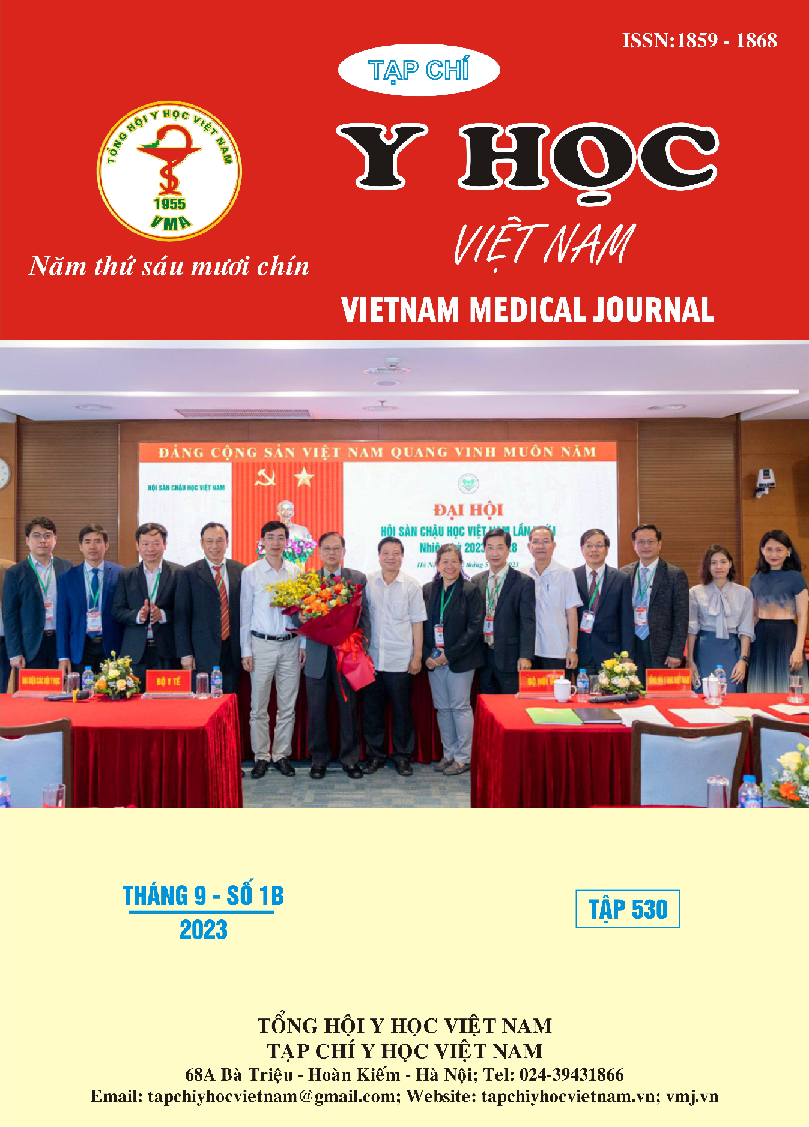KẾT QUẢ ỨNG DỤNG CHƯƠNG TRÌNH ERAS TRONG PHẪU THUẬT NỘI SOI ĐIỀU TRỊ UNG THƯ DẠ DÀY TẠI BỆNH VIỆN HỮU NGHỊ ĐA KHOA NGHỆ AN
Nội dung chính của bài viết
Tóm tắt
Mục tiêu: Đánh giá kết quả ứng dụng chương trình tăng cường hồi phục sau phẫu thuật (ERAS) trong phẫu thuật nội soi điều trị ung thư dạ dày tại Bệnh viện Hữu Nghị Đa khoa Nghệ An. Đối tượng và phương pháp: Nghiên cứu mô tả hồi cứu trên 83 bệnh nhân được chẩn đoán ung thư dạ dày và được điều trị phẫu thuật nội soi tại Bệnh viện HNĐK Nghệ An từ tháng 02/2021 đến tháng 07/2022. Kết quả: Tuổi trung bình là 67,9 ± 9,5 tuổi (46-89), 62,7% là nam giới và 37,3% là nữ giới. Chỉ số BMI trung bình 18,98 ± 2,05 (15.5 - 25.5) kg/m2, phân loại ASA II chiếm 56,6% và ASA III chiếm 28,9%. Thời gian phẫu thuật trung bình 157 ± 39,78 (90-240) phút. Tỷ lệ tuân thủ chung các can thiệp của quy trình ERAS là 69.9%. Trong đó mỗi can thiệp có tỷ lệ tuân thủ khác nhau. Điểm VAS trung bình của 4 ngày đều < 4 điểm. Nhóm bệnh nhân thực hiện nhiều can thiệp của chương trình ERAS có thời gian trung tiện ngắn hơn, thời gian nằm viện ngắn hơn. Tỷ lệ biến chứng sau phẫu thuật là 16,9%, trong đó chủ yếu là viêm phổi. Thời gian nằm viện ở nhóm bệnh nhân có biến chứng dài hơn nhóm không có biến chứng (p<0,05). Kết luận: Ứng dụng chương trình ERAS trong phẫu thuật ung thư dạ dày là phương pháp an toàn, góp phần giảm biến chứng và nâng cao hiệu quả điều trị
Chi tiết bài viết
Từ khóa
Tăng cường hồi phục sau phẫu thuật, ung thư dạ dày, ERAS.
Tài liệu tham khảo
2. M. Melnyk, R. G. Casey, P. Black, and A. J. Koupparis, “Enhanced recovery after surgery (ERAS) protocols: Time to change practice?,” Can. Urol. Assoc. J. J. Assoc. Urol. Can., vol. 5, no. 5, pp. 342-348, Oct. 2011, doi: 10.5489/cuaj.11002.
3. K. K. Varadhan, D. N. Lobo, and O. Ljungqvist, “Enhanced recovery after surgery: the future of improving surgical care,” Crit. Care Clin., vol. 26, no. 3, pp. 527-547, x, Jul. 2010, doi: 10.1016/j.ccc.2010.04.003.
4. Ngô Sỹ Quý, “Bước đầu đánh giá hiệu quả của chiến lược ERAS trong phẫu thuật đại trực tràng,” Luận Văn Thạc Sỹ Học - Trường Đại Học Hà Nội, 2019.
5. P. Bucher, P. Gervaz, C. Soravia, B. Mermillod, M. Erne, and P. Morel, “Randomized clinical trial of mechanical bowel preparation versus no preparation before elective left-sided colorectal surgery,” Br. J. Surg., vol. 92, no. 4, pp. 409-414, Apr. 2005, doi: 10.1002/ bjs.4900.
6. Z. Yang, Q. Zheng, and Z. Wang, “Meta-analysis of the need for nasogastric or nasojejunal decompression after gastrectomy for gastric cancer,” Br. J. Surg., vol. 95, no. 7, pp. 809-816, Jul. 2008, doi: 10.1002/bjs.6198.
7. G. Liu, F. Jian, X. Wang, and L. Chen, “Fast-track surgery protocol in elderly patients undergoing laparoscopic radical gastrectomy for gastric cancer: a randomized controlled trial,” OncoTargets Ther., vol. 9, pp. 3345-3351, Jun. 2016, doi: 10.2147/OTT.S107443.
8. So Hyun Kang and Yoon Taek Lee, “Multimodal Enhanced Recovery After Surgery (ERAS) Program is the Optimal Perioperative Care in Patients Undergoing Totally Laparoscopic Distal Gastrectomy for Gastric Cancer: A Prospective, Randomized, Clinical Trial,” Ann Surg Oncol, vol. 25, pp. 3231-3238.


